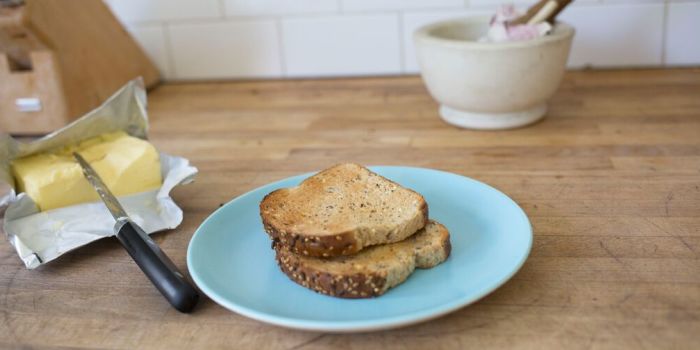What are ultra processed foods?
In the UK, it’s estimated that over half of our calories come from ultra processed foods. But what are ultra processed foods? And how can they impact our health? In this article, I’ll look at what counts as an ultra processed food, what the health risks are, and how to avoid eating too many of them.

What is an ultra-processed food?
Food can be organised into different groups based on how processed they are. This is known as the NOVA food classification system. There are four main categories as described below.
Category one: Unprocessed or minimally processed foods
Unprocessed, or minimally processed foods, have no added ingredients. Minimally processed foods are natural foods that have been altered by a process. For example, this could include removing an inedible part of a plant.
Unprocessed foods include:
- fresh and frozen fruits and vegetables
- legumes such as peas and lentils
- meat excluding bacon, sausages and other processed forms
- seafood
- eggs
- milk
Category two: Processed culinary ingredients
A processed culinary ingredient isn’t usually eaten alone but is added to foods in group one to make a meal or add flavour. Examples include salt, sugar, honey, and oils.
Category three: Processed foods
A processed food combines foods in category one and category two and have two to three ingredients.
Some examples of processed foods include:
- cheeses
- freshly made bread
- smoked, and cured meats
- tinned fruits and vegetables
Processed foods can provide you with many key nutrients and can be a healthy part of your diet. For example, unsweetened yoghurt is classed as a processed food, but it also provides you with calcium and protein.
Category four: Ultra processed foods
An ultra processed food is one which typically has five or more ingredients. You might not recognise the names of some of the ingredients in these foods. This is because they often include sweeteners, chemicals, colourings, and preservatives.
Some examples of ultra processed foods include:
- mass produced packaged bread, pastries, cakes and biscuits
- breakfast cereals
- carbonated drinks
- fruit flavoured yogurts
- sausages and bacon
- ready meals
What are the health risks of ultra processed foods?
Ultra processed food tends to be high in calories, salt, sugar, and saturated fats. They’re also usually low in vitamins, minerals, and fibre.
Ultra processed foods are easy to overeat because they are designed to taste good. If you regularly eat a lot of these foods, it could lead to overweight or obesity.
Studies have shown that consuming a lot of ultra processed foods over a long time can increase your risk of cardiovascular disease.
It’s also thought that the ingredients used in ultra processed foods (such as stabilisers and emulsifiers) could also be negatively impacting the gut microbiome. But more research needs to be done to fully understand how these foods affect our bodies.
How do you avoid ultra processed foods?
The best approach is to cook as much of your food as you can. This means you’re likely to use more fresh and minimally processed ingredients. However, even when you prepare food at home it’s important to think about the type of ingredients you’re using.
For example, try to choose fresh bread from the bakery instead of buying a pre-packaged loaf. Or you could try and make your own! This means the ingredients are less likely to contain extra additives and emulsifiers.
Processed foods such as tinned tomatoes, natural yogurt, and cheese can be a nutritious addition to your diet when you eat them in moderation. The key is to try and choose processed foods with as few (especially unrecognisable) ingredients as possible. When you buy snacks, try to choose options such as dried fruit, oatcakes, and nuts.
Ultra processed foods can be hard to avoid, but it’s important to try to choose less processed, healthier options when possible.
Do you know how healthy you truly are? Bupa health assessments give you a clear overview of your health and a view of any future health risks. You'll receive a personal lifestyle action plan with health goals to reach for a happier, healthier you.
-
Sources Sources
- Ultra processed foods and obesity in the UK. Table debates.org. tabledebates.org, accessed 28 September 2023. Rauber F, Steele EM, Louzada MLDC, Millett C, Monteiro CA, Levy RB. Ultra-processed food consumption and indicators of obesity in the United Kingdom population (2008-2016). PLoS One. 2020 ;15(5):e0232676. doi: 10.1371/journal.pone
- Ultra processed foods – how bad are they for your health? British Heart Foundation UK. bhf.org.uk, accessed 28 September 2023
- De Siena M, Raoul P, Costantini L, Scarpellini E, Cintoni M, Gasbarrini A, Rinninella E, Mele MC. Food Emulsifiers and Metabolic Syndrome: The Role of the Gut Microbiota. Foods. 2022 Jul 25;11(15):2205. doi: 10.3390/foods11152205. Rauber F, Louzada MLDC, Martinez Steele E, et al
- Ultra-processed foods and excessive free sugar intake in the UK: a nationally representative cross-sectional study. BMJ Open 2019;9. doi: 10.1136/bmjopen-2018-027546
- Monteiro CA, Cannon G, Levy RB, Moubarac J-C, Jaime P, Martins AP, Canella D, Louzada ML, Parra D; with Ricardo C, Calixto G, Machado P, Martins C, Martinez E, Baraldi L, Garzillo J, Sattamini I. NOVA. The star shines bright. [Food classification. Public health]. World Nutrition January-March 2016, 7, 1-3, 28-38
- Srour B, Fezeu L K, Kesse-Guyot E, Allès B, Méjean C, Andrianasolo R M et al. Ultra-processed food intake and risk of cardiovascular disease: prospective cohort study (NutriNet-Santé) BMJ 2019; 365 :l1451 doi:10.1136/bmj.l1451
About our health information
At Bupa we produce a wealth of free health information for you and your family. This is because we believe that trustworthy information is essential in helping you make better decisions about your health and wellbeing.
Our information has been awarded the PIF TICK for trustworthy health information. It also follows the principles of the The Information Standard.

More diet and nutrition articles
Did you find our advice helpful?
We’d love to hear what you think. Our short survey takes just a few minutes to complete and helps us to keep improving our healthy lifestyle articles.
Legal disclaimer
This information was published by Bupa's Health Content Team and is based on reputable sources of medical evidence. It has been reviewed by appropriate medical or clinical professionals and deemed accurate on the date of review. Photos are only for illustrative purposes and do not reflect every presentation of a condition.
Any information about a treatment or procedure is generic, and does not necessarily describe that treatment or procedure as delivered by Bupa or its associated providers.
The information contained on this page and in any third party websites referred to on this page is not intended nor implied to be a substitute for professional medical advice nor is it intended to be for medical diagnosis or treatment. Third party websites are not owned or controlled by Bupa and any individual may be able to access and post messages on them. Bupa is not responsible for the content or availability of these third party websites. We do not accept advertising on this page.







